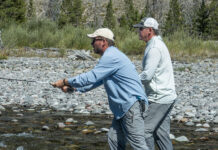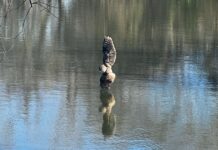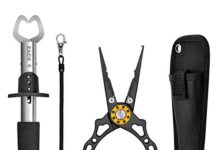When Jason and Jennifer Schall pack their fishing gear and head to the water, there’s a good chance they’ll be making a record catch.
That certainly turned out to be the case when they left their Summerville home in late May and began a long drive to Texas to hook up with their friend and guide Bubba Bedre in hopes of landing trophy alligator gar from the Trinity River.
To judge the trip successful would be a major understatement as they now have more than a dozen record catches pending with either the International Game Fish Association or National Freshwater Fishing Hall of Fame, including what could be the heaviest freshwater fish caught by a female angler in the world.
On the last fishing day of their trip (June 12), in the last hour of their fishing time, a monster alligator gar picked up a bait on the smallest outfit they were fishing. It was Jennifer’s turn on the rod, and she patiently waited for the fish to work the bait further down its toothy mouth before setting the hook. The battle was on and the monster gave them an indication of its size by tail-walking.
Jennifer Schall and guide Bubba Bedre with her pending world record 132-pound, 6-ounce alligator gar caught in the Trinity River in Texas. Jason Schall/Provided
After a 25-minute battle, she managed to get the fish to the side of the boat where Bubba and Jason put a lasso around the head and secured the fish. It was too large to bring into the boat so they headed to shore where they put the fish in a sling, hung it from IGFA-certified scales and got the weight – 132 pounds, 6 ounces. It will be a 50-pound women’s line class record if approved. And that seems only a formality since the Schalls are well-versed in IGFA protocols and IGFA has posted information about Jennifer’s catch on its website.
Jason holds both the men’s 16-pound line class record for alligator gar with a 120-pound, 4-ounce catch in 2018 and a fly fishing record with a 13-pound, 4-ounce catch on 2-pound tippet from 2016.
The Schalls, both 47, are a fishing couple. They have known each other since they were 12 and classmates in Summerville before going their separate ways. They reconnected and will celebrate their fifth wedding anniversary in October. And not surprisingly, one of their first dates was a fishing trip.
Between the IGFA and National Freshwater Fishing Hall of Fame, Jason has caught nearly 100 record fish and has landed approximately 700 unique species of fish on rod and reel. Including the catches submitted from this particular trip, Jennifer will have 16 world records. She has submitted a paddlefish record caught in Oklahoma from this trip to the National Freshwater Fishing Hall of Fame.
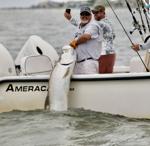
They are members of the Cabelas pro team and conduct fishing seminars at various Cabelas and Basspro locations. They also are certified S.C. Department of Natural Resources fishing instructors and enjoy working with youngsters at fishing clinics.
“Jason is an excellent angler and has gone after this particular fish before for world records but I never have,” Jennifer said. “We have been wanting to do a trip to Texas for a long time and finally were able to plan one for this past spring.”
Jennifer, who works as a quality manager for a local Navy defense contractor, was unable to fish every day because of work. But she was able to go out for evening trips and on weekends. Jason does product testing for numerous fishing tackle manufacturers.
“It was a good fight. I always play the fish like we’re using the lightest line possible. You just play it real careful. I just played it calm and steady. When she would get to the boat and be spooked, we’d do it all over again. It was exciting when we got to shore and got all her measurements and got her well-rested and revived. We made sure she swam off OK,” Jennifer said.
Jason explained that they used some rods that are normally used for big catfish and size 80 Okuma bait feeder spinning reels, although this one was caught using an Okuma 65 reel. They spool all their reels with IGFA-class line. He said several times during Jennifer’s fight the giant alligator gar would peel off enough line that they could see the knot that attached the line to the reel spool.
“It made for a lot of fun because of the excitement of wondering if you were going to lose all your line,” he said.
They used a 9/0 J-hook (an IGFA requirement) with a wire leader of 2 to 3 feet, a barrel swivel, a bead above the swivel to protect a sliding cork from bumping up against it and no weight. The purpose of the sliding cork is to indicate in which direction the fish is moving. For bait they used 12- to 15-inch carp which they caught earlier in the day, cutting the bait in half or thirds depending upon the size of the carp.
Jason said the Trinity River is normally a lighter chocolate color and is pretty slow moving. But they had some record rainfall and the river was above flood stage and some of the pastures and farmland along the river’s shoreline was under water, which may have benefited them since they were away from some of the obstructions in the main river channel. They fished in 10 to 15 feet of water.
“When you think about how many people fish all over the world, and how long world records have been maintained for fish, it is really amazing to think that just now, a little woman from Summerville has potentially caught the largest freshwater fish ever recorded in history by a female angler. I’m really excited for her,” Jason said.
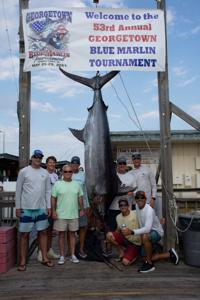
“We spent two weeks chasing after these prehistoric monsters nearly every day, and wouldn’t you know that Jennifer caught her record fish near the end of the very last day. Call it saving the best for last, or hard work finally paying off, or just fate, but it was so much fun to witness.”
Carolina Kingfish Classic
Extra Kristi took top honors in the Carolina Kingfish Classic fished out of Charleston Harbor Resort and Marina, landing a 42.7-pound king mackerel. Momma’s Money finished second with a 41.6-pound catch and Liqrbox as third with a 38.2-pound catch. Teacher’s Pet Too was fourth with a 36.4-pound king mackerel which also won the single outboard category. Mas Pescado finished fifth with a 35.9-pound catch.
America’s Boating Club
America’s Boating Club Charleston will hold boating safety classes Sept. 11, Oct. 2 and Nov. 6 at 1376 Orange Grove Road, Charleston. The classes begin at 9 a.m. and ends around 4 p.m. Successful participants earn the S.C. Department of Natural Resources Boater Education Card. The cost is $25 for adults and youth 12-18 are free. Call 843-312-2876 or email lynes@tds.net.
Credit: Source link






















